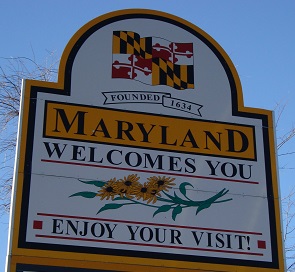Maryland’s Tax Scheme Violates the Commerce Clause in Comptroller v. Wynn

In a 5-4 decision, the U.S. Supreme Court recently held that the state of Maryland’s tax scheme is unconstitutional.
Since it fails to recognize taxes paid in other states, the Court found that the state’s personal income tax system violates the dormant Commerce Clause.
Facts of the Case
Maryland’s personal income tax on state residents consists of a “state” income tax and a “county” income tax. Residents who pay income tax to another jurisdiction for income earned in that other jurisdiction are allowed a credit against the “state” tax but not the “county” tax.
In Comptroller v. Wynne, Maryland residents who earned pass-through income from an S-corporation claimed an income tax credit on their 2006 Maryland income tax return for taxes paid to other states. The Maryland State Comptroller of the Treasury allowed a credit against the residents “state” income tax but not against their “county” income tax and assessed a tax deficiency.
The Maryland Tax Court affirmed the decision, but the Circuit Court for Howard County reversed, finding that Maryland’s personal tax system violated the Commerce Clause of the Federal Constitution. The Court of Appeals of Maryland affirmed and held that the tax unconstitutionally discriminated against interstate commerce.
The Dormant Commerce Clause
The Commerce Clause expressly grants Congress power to “regulate Commerce . . . among the several States.” However, it also contains an unwritten restriction on the power of the states. Under the “dormant” Commerce Clause doctrine, states are precluded from “discriminat[ing] between transactions on the basis of some interstate element.”
Accordingly, a State “may not tax a transaction or incident more heavily when it crosses state lines than when it occurs entirely within the State.” Armco Inc. v. Hardesty, 467 U. S. 638, 642 (1984). “Nor may a State impose a tax which discriminates against interstate commerce either by providing a direct commercial advantage to local business or by subjecting interstate commerce to the burden of ‘multiple taxation.’”
Since the Dormant Commerce Clause does not explicitly stem from any textual provision, but rather is entirely implied from the Commerce Clause, it a the subject of frequent criticism from originalists, who view the Constitution’s text as fixed at the time of enactment. Comptroller v. Wynne is no exception.
The Supreme Court’s Decision
Justice Alito wrote the majority opinion, which was joined by the Chief Justice and Justices Kennedy, Breyer and Sotomayor. According to the majority, the Court’s existing dormant Commerce Clause cases “all but dictate the result reached in this case by Maryland’s highest court.”
In reaching its decision, the majority relied on several cases in which the Court struck down a state tax scheme that might have resulted in the double taxation of income earned out of the State and that discriminated in favor of intrastate over interstate economic activity. With regard to Maryland’s tax scheme, the Court found that because it “creates an incentive for taxpayers to opt for intrastate rather than interstate economic activity, the law “has the same economic effect as a state tariff, the quintessential evil targeted by the dormant Commerce Clause.”
Justices Scalia, Thomas, Kagan and Ginsburg dissented, although for different reasons. In his sharply worded dissent, Justice Scalia characterized the dormant Commerce Clause as a “judicial fraud,” writing:
The fundamental problem with our negative Commerce Clause cases is that the Constitution does not contain a negative Commerce Clause. It contains only a Commerce Clause, [which] says nothing about prohibiting state laws that burden commerce. Much less does it say anything about authorizing judges to set aside state laws they believe burden commerce. The clearest sign that the negative Commerce Clause is a judicial fraud is the utterly illogical holding that congressional consent enables States to enact laws that would otherwise constitute impermissible burdens upon interstate commerce.
The justices of the Roberts Court clearly have very differing opinions regarding the validity and application of the Dormant Commerce Clause. It will be interesting to see how the Court’s jurisprudence evolves, as the justices have several other cases on the docket involving restrictions on inter-state commerce.
Previous Articles
SCOTUS Wraps Up Oral Arguments for the Term
by DONALD SCARINCI on May 17, 2022
The U.S. Supreme Court has concluded its oral arguments for the October 2021 Term. The justices hea...
SCOTUS Rules Censure of Elected Board Member Didn’t Violate First Amendment
by DONALD SCARINCI on May 10, 2022
In Houston Community College System v. Wilson, 595 U.S. ____ (2022), the U.S. Supreme Court held th...
Supreme Court Breach Is Not the First Involving Roe v. Wade
by DONALD SCARINCI on
The recent disclosure of Justice Samuel Alito’s decision purporting to overturn Roe v. Wade is ar...
The Amendments
-
Amendment1
- Establishment ClauseFree Exercise Clause
- Freedom of Speech
- Freedoms of Press
- Freedom of Assembly, and Petitition
-
Amendment2
- The Right to Bear Arms
-
Amendment4
- Unreasonable Searches and Seizures
-
Amendment5
- Due Process
- Eminent Domain
- Rights of Criminal Defendants
Preamble to the Bill of Rights
Congress of the United States begun and held at the City of New-York, on Wednesday the fourth of March, one thousand seven hundred and eighty nine.
THE Conventions of a number of the States, having at the time of their adopting the Constitution, expressed a desire, in order to prevent misconstruction or abuse of its powers, that further declaratory and restrictive clauses should be added: And as extending the ground of public confidence in the Government, will best ensure the beneficent ends of its institution.




